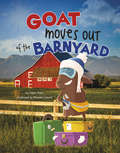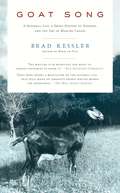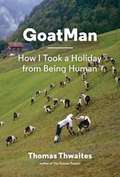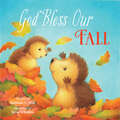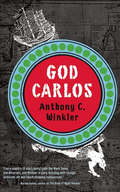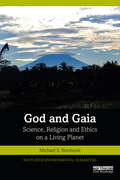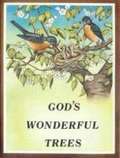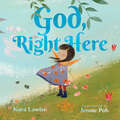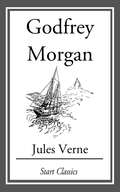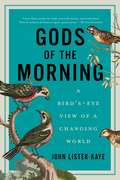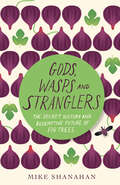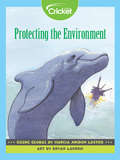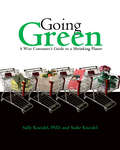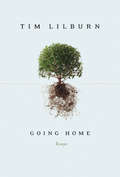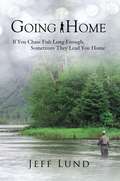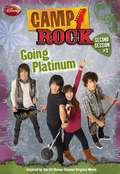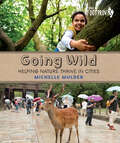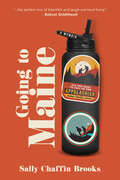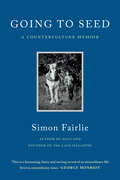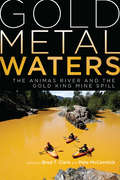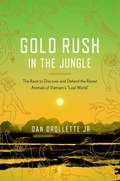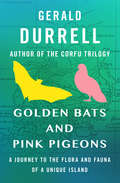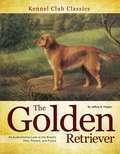- Table View
- List View
Goat Moves Out of the Barnyard (Habitat Hunter)
by Nikki PottsGoat is bored with its habitat! Follow Goat as it tries out different places to live. Which habitat will make the best home for Goat?
Goat Song: A Seasonal Life, A Short History of Herding, and the Art of Making Cheese
by Brad KesslerAcclaimed novelist Brad Kessler lived in New York City but longed for a life on the land where he could grow his own food. After years of searching for a home, he and his wife, photographer Dona Ann McAdams, found a mountain farmhouse on a dead-end road, with seventy-five acres of land. One day, when Dona returned home with fresh goat milk from a neighbor's farm, Kessler made a fresh chèvre, and their life changed forever. They decided to raise dairy goats and make cheese. Goat Song tells about what it's like to live intimately with animals who directly feed you. As Kessler begins to live the life of a herder -- learning how to care for and breed and birth goats -- he encounters the pastoral roots of so many aspects of Western culture. Kessler reflects on the history and literature of herding, and how our diet, our alphabet, our religions, poetry, and economy all grew out of a pastoralist milieu among hoofed animals. Kessler and his wife adapt to a life governed by their goats and the rhythm of the seasons. And their goats give back in immeasurable ways, as Kessler proves to be a remarkable cheesemaker, with his first tomme of goat cheese winning lavish praise from America's premier cheese restaurants. In the tradition of Thoreau's Walden and Annie Dillard's Pilgrim at Tinker Creek, Goat Song is both a spiritual quest and a compelling and beautiful chronicle of living by nature's rules.
GoatMan: How I Took a Holiday from Being Human
by Thomas ThwaitesThe dazzling success of The Toaster Project, including TV appearances and an international book tour, leaves Thomas Thwaites in a slump. His friends increasingly behave like adults, while Thwaites still lives at home, "stuck in a big, dark hole." Luckily, a research grant offers the perfect out: a chance to take a holiday from the complications of being human--by transforming himself into a goat. What ensues is a hilarious and surreal journey through engineering, design, and psychology, as Thwaites interviews neuroscientists, animal behaviorists, prosthetists, goat sanctuary workers, and goatherds.From this, he builds a goat exoskeleton--artificial legs, helmet, chest protector, raincoat from his mum, and a prosthetic goat stomach to digest grass (with help from a pressure cooker and campfire)--before setting off across the Alps on four legs with a herd of his fellow creatures. Will he make it? Do Thwaites and his readers discover what it truly means to be human?GoatMan tells all in Thwaites's inimitable style, which NPR extols as "a laugh-out- loud-funny but thoughtful guide through his own adventures."
God Bless Our Fall (A God Bless Book)
by Hannah HallShare the blessings of fall with your little one in God Bless Our Fall. Children will enjoy the bright autumn colors and cozy rhymes in this sweet board book that celebrates the harvest season with woodland animals.Parents and children will cuddle up together again and again to see the snuggly animal families enjoy their fall activities and hear the sweet rhyming story. Pumpkin patches, apple harvests, leaves that change color, hayrides, warm beverages, cozy clothes—God Bless Our Fall highlights all the wonderful things families get to enjoy together when the air turns crisp and cool. This board book is a wonderful way to introduce fun fall traditions to little ones and guide them in giving thanks for God&’s blessings of the season. God Bless Our Fall, for children ages 0–4, featuresbeautiful rhyming verses that give thanks for God&’s creation;bright, colorful illustrations that show foxes, squirrels, deer, and other woodland animals; anda padded cover, perfect for little hands and cozying up together for a read-aloud story time.Featuring the same talented writer and illustrator combination from God Bless You and Good Night, God Bless Our Fall makes a great gift forgrandparents and parents with little ones who enjoy fall; andseasonal holiday gift giving, such as harvest celebrations, Thanksgiving, or autumn festivals.Check out these other books in the A God Bless Book series:God Bless You and Good NightGod Bless You and Good Night Touch and FeelGod Bless Our EasterGod Bless Our ChristmasGod Bless My Boo BooGod Bless Our BabyGod Bless Our CountryGod Bless My FriendsGod Bless My FamilyGod Bless My SchoolGod Bless Our Bedtime Prayers
God Carlos
by Anthony C. WinklerA finalist for the 2014 Townsend Prize for Fiction!God Carlos has been long-listed for the OMC Bocas Prize for Caribbean Literature in Trinidad."A gusty, boisterous, and entertaining slice of historical fiction. In scenes of a mixture of pride, madness, and comedy, Carlos plays out his role as deity among the naked islanders, living a fantasy that most readers will find believable, if horrific. Along with the horror, the book does offer some beautiful moments of discovery, as when, as Winkler narrates, the ship takes the Mona Passage to Jamaica . . . we hear of an Edenic island, green and aromatic, opened like a wildflower. For all of its scenes of braggadocio and brutality, the book often works on you like that vision."--Alan Cheuse, NPR, All Things Considered"Readers are transported to Jamaica, into Winkler's richly invented 16th century, where his flawless prose paints their slice of time, in turn both brutally graphic and lyrically gorgeous. Comic, tragic, bawdy, sad, and provocative, this is a thoroughly engaging adventure story from a renowned Jamaican author, sure to enchant readers who treasure a fabulous tale exquisitely rendered."--Library Journal"A tale of the frequently tragic--and also comic--clash of races and religions brought on by colonization...Anthony Winkler spins an enlightened parable, rich in historical detail and irony."--Shelf Awareness"Darkly irreverent . . . With a sharp tongue, Winkler, a native of Jamaica, deftly imbues this blackly funny satire with an exposé of colonialism's avarice and futility."--Publishers Weekly"With perceptive storytelling and bracing honesty, Mr. Winkler, author of a half-dozen well-reviewed books, has a lovely way of telling a good story and educating concurrently . . . God Carlos teaches history in a subtle but meaningful way. Too literary to be lumped in with typical historical fiction, and too historical to be lumped in with typical literary fiction, God Carlos defies categorization."--New York Journal of BooksGod Carlos transports us to a voyage aboard the Santa Inez, a Spanish sailing vessel bound for the newly discovered West Indies with a fortune-seeking band of ragtag sailors. She is an unusual explorer for her day, carrying no provisions for the settlers, no seed for planting crops, manned by vain, arrogant men looking for gold in Jamaica.Expecting to make landfall in paradise after over a month at sea, the crew of the Santa Inez instead find themselves in the middle of a timid, innocent people--the Arawaks--who walk around stark naked without embarrassment and who venerate their own customs and worship their own Gods and creeds. The European newcomers do not find gold, only the merciless climate that nourishes diseases that slaughter them. That the Arawaks believed that the arrivals were from heaven makes even more complicated this impossible entanglement of culture, custom, and beliefs, ultimately leading to mutual doom.
God and Gaia: Science, Religion and Ethics on a Living Planet (Routledge Environmental Humanities)
by Michael S NorthcottGod and Gaia explores the overlap between traditional religious cosmologies and the scientific Gaia theory of James Lovelock. It argues that a Gaian approach to the ecological crisis involves rebalancing human and more-than-human influences on Earth by reviving the ecological agency of local and indigenous human communities, and of nonhuman beings. Present-day human ecological influences on Earth have been growing at pace since the Scientific and Industrial Revolutions, when modern humans adopted a machine cosmology in which humans are the sole intelligent agency. The resultant imbalance between human and Earthly agencies is degrading the species diversity of ecosystems, causing local climate changes, and threatens to destabilise the Earth as a System. Across eight chapters this ambitious text engages with traditional cosmologies from the Indian Vedas and classical Greece to Medieval Christianity, with case material from Southeast Asia, Southern Africa and Great Britain. It discusses concepts such as deep time and ancestral time, the ethics of genetic engineering of foods and viruses, and holistic ecological management. Northcott argues that an ontological turn that honours the differential agency of indigenous humans and other kind, and that draws on sacred traditions, will make it is possible to repair the destabilising impacts of contemporary human activities on the Earth System and its constituent ecosystems. This book will be of considerable interest to students and scholars of the environmental humanities, history, and cultural and religious studies.
God's Wonderful Trees
by Mary M. Landis"God’s trees are a wonderful gift. They make the earth beautiful. What can a tree Do for me?"
God, Right Here: Meeting God in the Changing Seasons
by Kara LawlerGod, right here. God, right there. God's handiwork is everywhere. Yellow daffodils, flying seagulls, bright orange pumpkins, and swirling snowflakes—God's handiwork can be found all throughout nature, and every season is full of beauty and wonder. Everywhere we look, no matter the time of year, the wonders of creation remind us that God is always with us, always right here. Written by Kara Lawler and beautifully illustrated by Jennie Poh, this celebration of God's creation and the changing seasons can be enjoyed by children and the adults who read with them. Also included is a note from the author to encourage further conversation about the content. Discover IVP Kids and share with children the things that matter to God!
Godfrey Morgan
by Jules Verne"Godfrey Morgan: A Californian Mystery", also published as "School for Crusoes", is an 1882 adventure novel by French writer Jules Verne. It tells of a young adventurer, Godfrey Morgan, and his deportment instructor, Professor T. Artelett, who embark on a round-the-world ocean voyage. Their ship is wrecked and they are cast away on a remote island, where they rescue and befriend an African slave, Carefinotu.
Gods of the Morning: A Bird's-Eye View of a Changing World
by John Lister-KayeA celebration of birds that reflects a year in the wild, revealing how these amazing creatures embody our changing world, by one of Britain's foremost naturalists. Gods of the Morning follows the year through the turning of the seasons at Aigas, the Highlands estate John Lister-Kaye has transformed into a world-renowned wildlife center. John's affection, wisdom and lyricism sings off every page, bringing the natural world around him to life: from the rookery filled with twenty-nine nests and distinct bird calls to descriptions of the winter morning light, from the wood mice and the squirrels preparing for winter to tracking a fox's path through the snow. In particular it brings John's lifelong love of birds--his gods of the morning--to the fore. In the Highland glens, bird numbers plummet as their food supplies--natural fruits and every kind of creeping, crawling, slithering or flying bug--begin to disappear. Not just the swallows and house martins have vanished from round the houses. Gone are the insect snatching wheatears, whinchats and stonechats from the hills, and redstarts and flycatchers have fled the woods. Pied wagtails no longer flicker across the lawns and sandpipers and grey wagtails have deserted the river banks. Farmland and hedgerow species have vanished in the night: the linnets, yellowhammers, and all the warblers have decamped from the thickets. By the first frosts the hills will have emptied down to a few hardy stalwarts such as the golden eagles, the raven and the irrepressible hooded crows. Silence settles across the land. The few species that are left frequent a changed world. Soon only the buzzards and wood pigeons will hang on in the woods and the coniferous forests will be host to flocks of chaffinches, tits, siskins, and crossbills passing through.
Gods, Wasps and Stranglers: The Secret History and Redemptive Future of Fig Trees
by Mike Shanahan&“If you&’re looking for a dose of wonder in your reading life, I recommend this beautiful book about the magic of fig trees.&”—Book RiotOver millions of years, fig trees have shaped our world, influenced our evolution, nourished our bodies and fed our imaginations. And as author and ecologist Mike Shanahan proclaims, &“The best could be yet to come.&”Gods, Wasps and Stranglers weaves together the mythology, history and ecology of one of the world&’s most fascinating—and diverse—groups of plants, from their starring role in every major religion to their potential to restore rainforests, halt the loss of rare and endangered species and even limit climate change.In this lively and joyous book, Shanahan recounts the epic journeys of tiny fig wasps, whose eighty-million-year-old relationship with fig trees has helped them sustain more species of birds and mammals than any other trees; the curious habits of fig-dependent rhinoceros hornbills; figs&’ connection to Krishna and Buddha, Jesus and Muhammad; and even their importance to Kenya&’s struggle for independence.Ultimately, Gods, Wasps and Stranglers is a story about humanity&’s relationship with nature, one that is as relevant to our future as it is to our past.&“Surprising, engrossing, disturbing and promising, Gods, Wasps and Stranglers combines masterful storytelling and spellbinding science. This is a beautifully written and important book about trees that have shaped human destiny.&”—Sy Montgomery, author of The Soul of an Octopus
Going Global: Protecting the Environment
by Marcia Amidon LustedSometimes, preservation and conservation need to occur on a larger scale. Oceana, Greenpeace, and the World Wildlife Fund are dedicated to protecting resources all over the world—especially resources that all people share.
Going Green
by Sally Kneidel Sadie KneidelGoing Green focuses on the biggest environmental culprits of the American lifestyle--diet, housing, clothing, and transportation--and provides practical, effective steps we can take to reduce our carbon footprint and live more sustainably. Comprehensive and empowering, it will make you think twice about every dollar you spend.
Going Home: Essays
by Tim LilburnLike his contemporaries Robert Bringhurst, Ronald Wright, Dennis Lee, Don McKay, and Jan Zwicky, Tim Lilburn has long been a deep thinker on issues of ecology and writing, and on how the two fit together philosophically, morally, and ethically. In Going Home, Lilburn addresses how we relate (often uneasily) to our physical landscape in Canada and the United States.Retrieving an almost lost strand in the Western intellectual tradition -- the erotic, contemplative strand, from Plato to John Cassian to the Areopagite -- Lilburn traces a history of eros and desire in the hope that this exercise and its awakening can lead us home to a full residence in North America. Surprising and enlightening, the collection finishes with two unforgettable personal essays, where Lilburn writes about his effort to enact desire in the place where his ancestors are buried, the flatlands and coulees of southern Saskatchewan.
Going Home: If you chase fish long enough, sometimes they lead you home
by Jeff LundIt doesn't matter if you're in the woods every other weekend or every other day. Outdoorsman or angler are broad terms and applies to a large population. However, the title does not encapsulate someone who frequently engages in either. Ultimately, anglers, hunters, hikers, etc., are ordinary people whose lives move from anecdote to anecdote, until life gets serious. An outdoorsman is not immune to failure, complex life decisions, nor are things simpler. Being on the water with a fly rod or in the alpine with a rifle does not provide answers because neither a mountain or a fish can talk. However, when life brings trauma, a fly rod can be the best weapon with which to keep fighting. Going Home is a memoir about fishing, without being just about fishing. It's about a man contemplating direction and his sense of home after he is jerked from his linear journey of a life spent chasing fish.
Going Platinum (Camp Rock #3)
by Helen PerelmanMitchie thinks having her mom around as camp cook is tough. But when Tess´s mother arrives as a guest counselor, Mitchie realizes her drama is low-key in comparison. T.J. Tyler is a diva with a capital D! Can Camp Rock handle two Tylers in the spotlight?
Going Wild: Helping Nature Thrive in Cities (Orca Footprints #12)
by Michelle MulderWhat if the new key to making our lives safer (and even healthier) is to allow the wilderness back into our cities? Going wild. We don't see it as a good thing. And why would we? For most of our time on earth, humanity has been running from lions and other wilderness dangers. We've worked hard to make our local landscapes as safe and convenient as possible. Sometimes that's meant paving over areas that might burst into weeds. Other times, we've dammed rivers for electricity or irrigation. But now pollution, climate change and disruptions to the water cycle are affecting the world in ways we never anticipated. The epub edition of this title is fully accessible.
Going for the Rain: Poems
by Simon J. OrtizA member of the Acoma Pueblo in Arizona, Ortiz's poems evoke love and family and ceremony, the strains of disenfranchisement and the beautiful dry land.
Going to Maine: All the Ways to Fall on the Appalachian Trail
by Sally Chaffin BrooksFrom comedian Sally Chaffin Brooks comes a memoir about the thing she can't seem to shut up about— her life changing thru-hike of the Appalachian Trail. 25-year-old Sally has no reason to upend her comfortable, conventional life to spend 5 months hiking the Appalachian Trail; no reason except that her charismatic best friend, Erin, asked her to come along. A woefully out-of-shape Sally quickly realizes she may not actually be prepared for the realities of thru-hiking— brutal weather, wrong turns, and painful blisters have her wanting to quit almost as soon as she starts. But out of loyalty to Erin, or maybe the sinking realization that her life needed upending, Sally sticks it out. As she and Erin trek from Georgia to Maine, they collect a ragtag band of hikers and together stumble from one hilarious (and sometimes scary) predicament to another. By the time she reaches Maine— accompanied by Erin, their crew, and a guy she's maybe (definitely) falling in love with— readers will cheer for the stronger, more self-assured Sally that has emerged and wish they could start the laugh-out-loud, life-affirming adventure all over again.
Going to Seed: A Counterculture Memoir
by Simon FairlieAn unforgettable firsthand account of how the hippie movement flowered in the late 1960s, appeared spent by the Thatcher-consumed 1980s, yet became the seedbed for progressive reform we now take for granted—and continues to inspire generations of rebels and visionaries. "Fairlie has a refreshingly declarative style: he’s analytical, funny and self-aware. . . His memoir has much to offer anyone interested in movement history or in the future of intentional communities."—Elizabeth Royte, Food & Environment Reporting Network At a young age, Simon Fairlie rejected the rat race and embarked on a new trip to find his own path. He dropped out of Cambridge University to hitchhike to Istanbul and bicycle through India. He established a commune in France, was arrested multiple times for squatting and civil disobedience, and became a leading figure in protests against the British government’s road building programs of the 1980s and—later—in legislative battles to help people secure access to land for low impact, sustainable living. Over the course of fifty years, we witness a man’s drive for self-sufficiency, freedom, authenticity, and a deep connection to the land. Fairlie grew up in a middle-class household in leafy middle England. His path had been laid out for him by his father: boarding school, Oxbridge, and a career in journalism. But everything changed when Simon’s life ran headfirst into London’s counterculture in the 1960s. Finding Beat poetry, blues music, cannabis and anti–Vietnam War protests unlocked a powerful lust to be free. Instead of becoming a celebrated Fleet Street journalist like his father, Simon became a laborer, a stonemason, a farmer, a scythesman, and then a magazine editor and a writer of a very different sort. In Going to Seed he shares the highs of his experience, alongside the painful costs of his ongoing search for freedom—estrangement from his family, financial insecurity, and the loss of friends and lovers to the excesses and turbulence that continued through the 70s and 80s. Part moving, free-wheeling memoir, part social critique, Going to Seed questions the current trajectory of Western “progress”—and the explosive consumerism, growing inequality, and environmental devastation laid bare in our daily newsfeeds—and will resonate with anyone who wonders how we got to such a place. Simon’s story is for anyone who wonders what the world might look like if we began to chart a radically different course.
Going to Seed: A Counterculture Memoir
by Simon Fairlie"Simon Fairlie is possibly the most influential—and unusual—eco-activist you might not have heard of."—The ObserverAn unforgettable firsthand account of how the hippie movement flowered in the late 1960s, appeared spent by the Thatcher-consumed 1980s, yet became the seedbed for progressive reform we now take for granted—and continues to inspire generations of rebels and visionaries."Fairlie has a refreshingly declarative style: he&’s analytical, funny and self-aware. . . His memoir has much to offer anyone interested in movement history or in the future of intentional communities."—Elizabeth Royte, Food & Environment Reporting NetworkAt a young age, Simon Fairlie rejected the rat race and embarked on a new trip to find his own path. He dropped out of Cambridge University to hitchhike to Istanbul and bicycle through India. He established a commune in France, was arrested multiple times for squatting and civil disobedience, and became a leading figure in protests against the British government&’s road building programs of the 1980s and—later—in legislative battles to help people secure access to land for low impact, sustainable living.Over the course of fifty years, we witness a man&’s drive for self-sufficiency, freedom, authenticity, and a deep connection to the land.Fairlie grew up in a middle-class household in leafy middle England. His path had been laid out for him by his father: boarding school, Oxbridge, and a career in journalism. But everything changed when Simon&’s life ran headfirst into London&’s counterculture in the 1960s. Finding Beat poetry, blues music, cannabis and anti–Vietnam War protests unlocked a powerful lust to be free. Instead of becoming a celebrated Fleet Street journalist like his father, Simon became a laborer, a stonemason, a farmer, a scythesman, and then a magazine editor and a writer of a very different sort. In Going to Seed he shares the highs of his experience, alongside the painful costs of his ongoing search for freedom—estrangement from his family, financial insecurity, and the loss of friends and lovers to the excesses and turbulence that continued through the 70s and 80s.Part moving, free-wheeling memoir, part social critique, Going to Seed questions the current trajectory of Western &“progress&”—and the explosive consumerism, growing inequality, and environmental devastation laid bare in our daily newsfeeds—and will resonate with anyone who wonders what the world might look like if we began to chart a radically different course."This is a fascinating, funny and moving record of an extraordinary life lived in extraordinary times."—George Monbiot
Gold Metal Waters: The Animas River and the Gold King Mine Spill
by Brad T. Clark Pete McCormickGold Metal Waters presents a uniquely inter- and transdisciplinary examination into the August 2015 Gold King Mine spill in Silverton, Colorado, when more than three million gallons of subterranean mine water, carrying 880,000 pounds of heavy metals, spilled into a tributary of the Animas River. The book illuminates the ongoing ecological, economic, political, social, and cultural significance of a regional event with far-reaching implications, showing how this natural and technical disaster has affected and continues to affect local and national communities, including Native American reservations, as well as agriculture and wildlife in the region. This singular event is surveyed and interpreted from multiple diverse perspectives—college professors, students, and scientists and activists from a range of academic and epistemological backgrounds—with each chapter reflecting unique professional and personal experiences. Contributors examine both the context for this event and responses to it, embedding this discussion within the broader context of the tens of thousands of mines leaking pollutants into waterways and soils throughout Colorado and the failure to adequately mitigate the larger ongoing crisis. The Gold King Mine spill was the catalyst that finally brought Superfund listing to the Silverton area; it was a truly sensational event in many respects. Gold Metal Waters will be of interest to students and scholars in all disciplines, but especially in environmental history, western history, mining history, politics, and communication, as well as general readers concerned with human relationships with the environment. Contributors: Alane Brown, Brian L. Burke, Karletta Chief, Steven Chischilly, Becky Clausen, Michael A. Dichio, Betty Carter Dorr, Cynthia Dott, Gary Gianniny, David Gonzales, Andrew Gulliford, Lisa Marie Jacobs, Ashley Merchant, Teresa Montoya, Scott W. Roberts, Lorraine L. Taylor, Jack Turner, Keith D. Winchester, Megan C. Wrona, Janene Yazzie
Gold Rush in the Jungle: The Race to Discover and Defend the Rarest Animals of Vietnam's "Lost World"
by Dan DrolletteAn engrossing, adventure-filled account of the rush to discover and save Vietnam's most extraordinary animals Deep in the jungle where the borders of Vietnam meet those of Laos and Cambodia is a region known as "the lost world." Large mammals never seen before by Western science have popped up frequently in these mountains in the last decade, including a half-goat/half-ox, a deer that barks, and a close relative of the nearly extinct Javan rhino. In an age when scientists are excited by discovering a new kind of tube worm, the thought of finding and naming a new large terrestrial mammal is astonishing, and wildlife biologists from all over the world are flocking to this dangerous region. The result is a race between preservation and destruction. Containing research gathered from famous biologists, conservationists, indigenous peoples, former POWs, ex-Viet Cong, and the first U.S. ambassador to Vietnam since the war's end, Gold Rush in the Jungle goes deep into the valleys, hills, and hollows of Vietnam to explore the research, the international trade in endangered species, the lingering effects of Agent Orange, and the effort of a handful of biologists to save the world's rarest animals.
Golden Bats and Pink Pigeons: A Journey to the Flora and Fauna of a Unique Island (El\libro De Bolsillo Ser.)
by Gerald DurrellTravel to Mauritius on a quest to save endangered species with the British naturalist whose work inspired Masterpiece production The Durrells in Corfu. The green and mountainous island of Mauritius in the Indian Ocean was once the home of the ill-fated dodo. The island saw many other animals vanish from its soil, and by the 1970s, numerous species were close to being eliminated. Enter Gerald Durrell. Durrell sets out on a search for bats and pink pigeons, climbing near-vertical rock faces to find Telfair&’s skinks and Gunther&’s geckos, and swimming about coral reefs with multicolored marine life. But rounding up a collection to take back with him to his animal sanctuary in the English Channel won&’t be easy: There are many dangers awaiting him. Golden Bats and Pink Pigeons is a delightful and inspiring adventure by the author of My Family and Other Animals, among other much-loved memoirs. This ebook features an illustrated biography of Gerald Durrell including rare photos from the author&’s estate.
Golden Retriever
by Jeffrey G. PepperFourth in the Kennel Club Books' Classics series, The Golden Retriever recognizes the ever-popular all-American breed in this one spectacular volume. Written by author, breeder, and judge, Jeffrey G. Pepper, this book's engaging chapters on everything from the breed's accomplishments in performance events, to their participation as service dogs make it much more than just "another breed book." With more than 100 vintage and modern photographs of the breed, this book is a must-have for every Golden owner.
